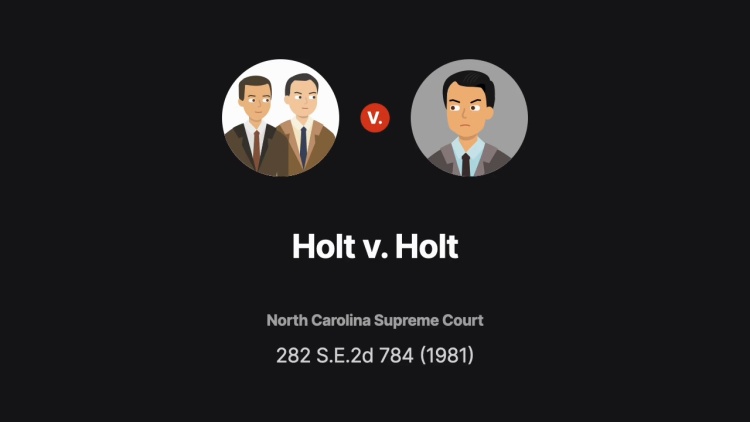Holt v. Holt
North Carolina Supreme Court
282 S.E.2d 784, 304 N.C. 137 (1981)

- Written by Mary Phelan D'Isa, JD
Facts
Annie H. Holt executed a will devising her estate to her sons, Verdie Holt (defendant), Vernon Holt (plaintiff), and William Holt (defendant), in equal shares. However, about seven years before her death, Annie executed a codicil leaving the entirety of her estate to Verdie and William and disinheriting Vernon. As explanation, the codicil stated that Vernon had not treated Annie as a child should treat a mother. After Annie’s death, at the reading of the will, Vernon became irate and threatened litigation. To restore family unity, Verdie and William agreed with Vernon that they would probate the will but not the codicil. According to Verdie and William, there was also an agreement that William would receive the largest share of the property and Verdie and Vernon would execute reciprocal deeds to accomplish this. The codicil was then torn into pieces, and the will was probated. When Vernon failed to execute a deed in William’s favor, claiming that he never agreed to do so, Verdie and William reconstituted the codicil and offered it for probate. Vernon sued Verdie and William, seeking enforcement of the agreement that they would share Annie’s property equally. Both sides moved for summary judgment, and the trial court held in Verdie and William’s favor. The appellate court reversed, concluding that because the family agreement was supported by sufficient consideration and did not violate public policy, it was enforceable. Verdie and William appealed to the North Carolina Supreme Court, contesting the sufficiency of consideration.
Rule of Law
Issue
Holding and Reasoning (Exum, J.)
What to do next…
Here's why 911,000 law students have relied on our case briefs:
- Written by law professors and practitioners, not other law students. 47,100 briefs, keyed to 997 casebooks. Top-notch customer support.
- The right amount of information, includes the facts, issues, rule of law, holding and reasoning, and any concurrences and dissents.
- Access in your classes, works on your mobile and tablet. Massive library of related video lessons and high quality multiple-choice questions.
- Easy to use, uniform format for every case brief. Written in plain English, not in legalese. Our briefs summarize and simplify; they don’t just repeat the court’s language.





